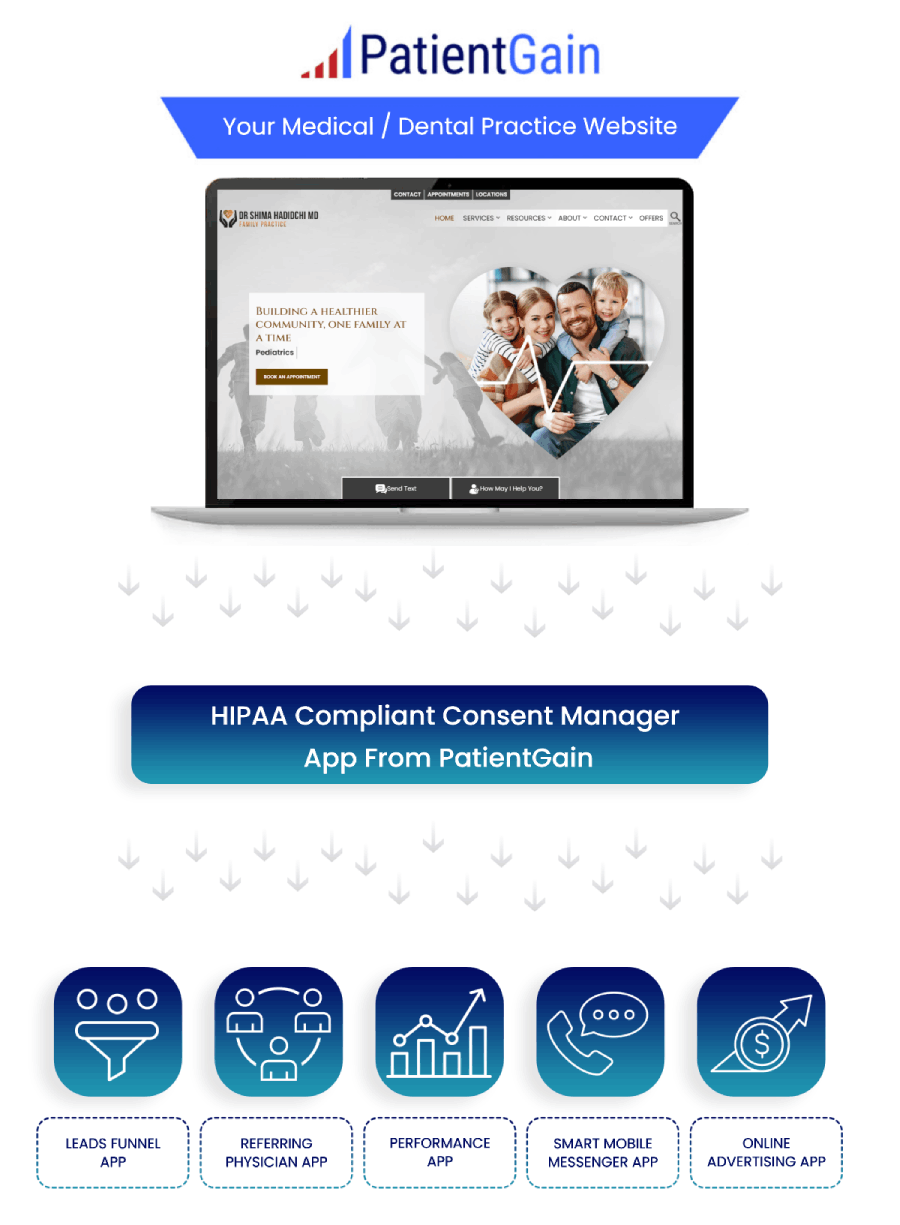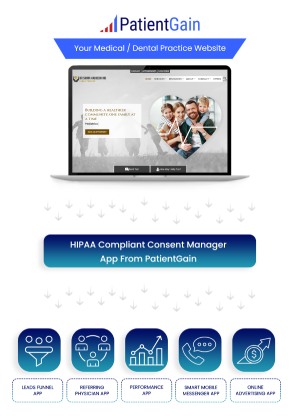HIPAA Consent Management App for Medical & Dental Websites
Common question PatientGain gets asked everyday: When a patient contacts my practice from website, do I need to get explicit consent and opt-in for privacy policy of my practice?
Answer is YES. Every patient who sending you any PHI, must be made aware of your PHI related policies.


Why HIPAA Consent Management App for Healthcare Websites is Required in 2026
A HIPAA consent management app is required for healthcare websites and digital tools in 2026 not because of a single new law, but due to a convergence of factors including: increased regulatory scrutiny and enforcement, the proliferation of digital health data, and updated interpretations of existing HIPAA rules that emphasize patient rights and robust security controls.
Key Drivers
- Heightened Enforcement and Penalties: The U.S. Department of Health and Human Services (HHS) Office for Civil Rights (OCR) is increasing its enforcement and imposing substantial fines for data breaches and non-compliance. An individual data breach can result in fines ranging from $1,000 to $1 million, making proactive compliance an operational imperative.
- Expansion of Patient Rights: Patients have greater control over their health data, including streamlined processes for accessing, amending, and sharing their information. Consent management applications provide the necessary mechanisms for users to give, manage, and revoke consent for data use and sharing, which supports these expanded patient rights.
- Evolving Cyber Threats: The healthcare industry is a prime target for cyberattacks, with hundreds of millions of patient records exposed in recent years. There are additional updates to the HIPAA Security Rule formalize the need for stronger security measures like mandatory multi-factor authentication (MFA), end-to-end encryption, and continuous risk assessments, which consent management apps help facilitate.
- Digital Health Growth: The widespread adoption of telehealth, mobile health apps, and other digital tools has created new challenges for managing and securing electronic Protected Health Information (ePHI). Websites and applications that collect, store, or transmit ePHI must be HIPAA compliant, which includes having formal consent management procedures and applications, and application providers must provide BAA to the healthcare providers.
- Third-Party Accountability: HIPAA compliance responsibilities have expanded to include business associates and third-party vendors (such as cloud service providers or analytics platforms – examples include Facebook, Instagram Pixels, Google Tag Manager – which are not HIPAA compliant). A proper consent management app helps ensure that consent signals are appropriately managed when data is shared with these external services, and that Business Associate Agreements (BAAs) are in place.
- Data Minimization and Audit Trails: There’s an increased emphasis on collecting only necessary data and maintaining detailed audit logs of all access and activity involving ePHI. Consent management apps provide the framework for tracking when patient consent is obtained, what it covers, and for how long it remains valid, providing an essential audit trail for compliance verification.
What is the validity of patient consents for HIPAA?
A HIPAA consent form is valid until it is revoked or a specific expiration date or event occurs, as stated on the form. If no expiration date or event is specified, the authorization is generally considered valid for one year from the date it was signed. The patient can revoke the authorization in writing at any time.
Factors that determine validity
- Expiration date or event: The form must have a specific expiration date (e.g., “12/31/2030”) or an expiration event (e.g., “completion of the research study” or “end of litigation”).
- Default to one year: If no expiration date or event is specified, the authorization is valid for one year from the date it was signed, this is the default. However this can change from state to state, and jurisdiction to jurisdiction.
- Written revocation: A patient can revoke the authorization by providing written notice to the healthcare provider or organization.
- Actions taken before revocation: Revoking an authorization does not affect any disclosures that were already made before the revocation was received.
Examples of expiration events
- “Upon termination of healthcare plan/service”
- “Upon completion of the research study”
- “Upon the minor’s age of majority”
- “End of treatment” or “end of the treatment” (for treatment, payment, or operations)
Does HIPAA consent expire after death of a patient?
No, HIPAA protections do not expire immediately upon death; they apply to a deceased individual’s health information for 50 years after their death. During this time, healthcare providers must continue to protect the confidentiality of the information and can only disclose it under specific circumstances, such as to the deceased’s personal representative or a family member involved in their care, provided the individual did not express a prior objection.
Key considerations
- 50-Year Rule: The HIPAA Privacy Rule protects a deceased individual’s health information for 50 years after their death. After 50 years, the information is no longer protected by HIPAA and can be accessed for purposes like genealogy or historical study.
- State Laws: Many states have their own laws that may provide additional protections or have different rules for accessing a deceased person’s records. It is important to understand both federal HIPAA regulations and the specific laws of the state where the person lived.
- Special notes: Psychotherapy notes receive a higher level of protection and are generally not disclosed after death, except in limited circumstances like with a proper authorization or a legal requirement.
Does PatientGain.com’s PLATINUM service include consent management app?
Yes, PatientGain.com’s services include a built-in Consent Management App (CMA), provided you are a subscriber to their PLATINUM or PLATINUM+ service tiers.
The Consent Management App for medical and dental websites is a HIPAA-compliant digital solution designed to help healthcare practices securely manage patient consent directly from your practice’s website.
Key features of the PatientGain consent management system include:
- Obtaining Consent: It captures informed patient consent directly from the website’s front end.
- Enforcing Preferences: The app is integrated with the PatientGain platform to enforce patient privacy preferences automatically.
- Logging and Audit-Readiness: All consent activities are logged, providing an auditable trail to prove compliance with regulations like HIPAA.
- Integration: It integrates with other PatientGain apps, such as secure forms and CRM, to ensure all protected health information (PHI) is handled compliantly.
- Easy management: A simple dashboard is provided so the practice managers can easily see the IP addresses and patients who have provided consent.
